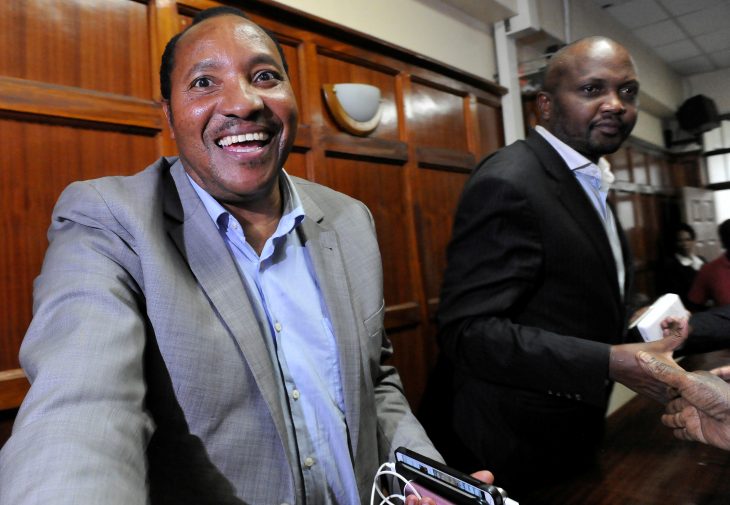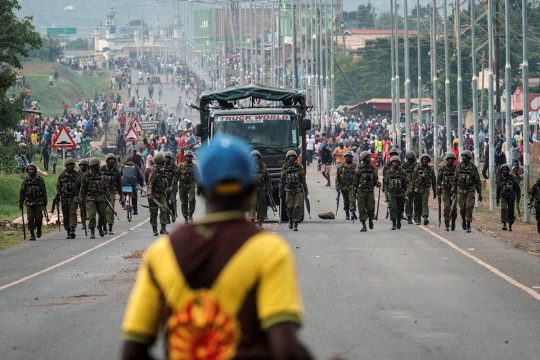When Kenyan police moved early this week to arrest eight parliamentarians for hate speech, it was seen as a right step to stop people, especially politicians, from uttering words that could incite inter-ethnic hatred among Kenyans. The eight, who claim to be innocent, were released on bail on Friday evening after being charged with hate speech and incitement to violence. The cases will be heard between July 7 and 11. Wounds are still open after post-election violence in 2007-2008 which left 1,300 people dead and hundreds displaced. Many Kenyans are worried violence could reignite in the run-up to the 2017 polls.
"The general consensus among Kenyans is that hate speech must never be allowed to gain traction," the Kenyan Standard newspaper wrote in an editorial. "We can have our political differences, because that is what democracy is all about, but at all times the interests of the country must take precedence."
The suspects are MPs Moses Kuria, Ferdinand Waititu and Kimani Ngunjiri from the ruling Jubilee party; and Timothy Bosire, Junet Mohammed, Aisha Jumwa, Florence Mutua and Senator Johnson Muthama from the opposition CORD alliance. Their arrest followed weeks of deadly opposition demonstrations against the Independent Electoral and Boundaries Commission (IEBC), which CORD leader and former Prime Minister Raila Odinga believes cheated him of victory in 2013.
The prosecution alleges that Kuria, who represents President Uhuru Kenyatta's home constituency of Gatundu South, warned Odinga would be assassinated for leading protestors to destroy people's property. He was speaking in the vernacular Kikuyu language at a church thanksgiving service in Nairobi on June 13. According to the Prosecutor, Waititu also suggested killing the opposition leader, while Ngunjiri, speaking in Kiswahili, allegedly said that Luo people in Nakuru town should be sent back to their "native land" in the west. Kuria, Waititu and Ngunjiri hail from President Uhuru Kenyatta's Kikuyu ethnic group, while Odinga is a member of the Luo ethnic group.
As for the opposition MPs, the prosecution says that Junet, Muthama, Bosire, Ms Mutua and Ms Jumwa uttered words at a June 13 press conference in Nairobi to the effect that they would create chaos and forcibly storm the Police Headquarters if "certain people" were not arrested.
Ethnic violence that claimed more than a thousand lives erupted after the 2007 general elections, mainly between the Kikuyus on one side and Luos and Kalenjins on the other side. Current President Uhuru Kenyatta (Kikuyu) and Vice-President William Ruto (Kalenjin) were indicted by the International Criminal Court (ICC) for involvement in those clashes but the case was finally dropped.
Released on bail
The eight politicians appeared on June 14 before the High Court. After hearing arguments from their respective lawyers, the court decided to keep them in custody for four days to allow the prosecution to carry out in-depth investigations as it had requested.
For Jubilee, lawyer Francis Munyororo opposed their detention, saying bail was a constitutional right. He said the subjects were willing to report to respective police stations for eventual interrogation. For CORD, senator and defence lawyer James Orengo also opposed the preventive detention. He claimed that the CORD leaders voluntarily appeared before the police and were not arrested as reported.
But chief magistrate Daniel Ogembo said that "pre-trial detention may be necessary to preserve public order". He said the suspects' alleged statements involved "intention to cause death, eviction of certain communities from the metropolitan city of Nakuru and storming the Inspector-General's office" which were "serious and destructive to a nation's fabric''.
The eight suspects were back in court on Friday and were all released on bond after being charged with hate speech and incitement to violence. The cases will be heard between July 7 and 11.
The freedom of expression debate
If convicted, the eight legislators are likely to face three years in jail or a fine of one million shillings (10,000 dollars). But human rights lawyers believe the Kenyan Constitution, drafted in 2010, is unclear with regard to limits on freedom of expression. They predict that the task may not be easy for the prosecution. "Incitement to violence is different from hate speech," said Nairobi-based human rights lawyer Harun Ndubi. "Hate speech is itself so fluid in definition that it is difficult to sustain a case."
In a bid to stem political and ethnically-based violence after 2007-2008, Kenya formed the National Cohesion and Integration Commission (NCIC), which was given a mandate to monitor hateful speech. But the Commission, headed by former National Assembly Speaker Francis Ole Kaparo, doesn't have a mandate to prosecute.
Despite more than 10 cases pending in the courts since 2014, mostly involving politicians, no single case has ever resulted in a conviction. "When you look at the NCIC Act, it is too focused on ethnicity, yet hate speech goes beyond ethnicity or political incitement," said Kenya National Commission for Human Rights (KNHCR) commissioner Lawrence Mute. He also said that when hate speech was, for example, targeted at gender, it becomes difficult to prosecute because it is difficult to know "under what law do you do it".
Observers and foreign diplomats have also warned that political and ethnic tensions ahead of the August 2017 national elections could plunge the country into another round of post-election violence. Meanwhile, the KNHCR has said it will blacklist "war-mongering" politicians and will not allow them to stand in the élections.






